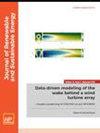利用合作博弈论和 CSP 为基于 MIES 的共享储能提供最优分配方法
IF 1.9
4区 工程技术
Q4 ENERGY & FUELS
引用次数: 0
摘要
为进一步促进多集成能源系统(MIES)中储能的高效利用和可再生能源的本地消纳,我们根据共享储能站(SESS)的运行特点和盈利机制,并考虑到聚光太阳能发电(CSP)、综合需求响应和可再生能源输出的不确定性,建立了一个多集成能源系统模型。我们基于合作博弈论和 CSP 提出了相应的 MIES 模型,并提出了 MIES 共享储能的优化分配方法。该模型以 SESS 的最大运营效益为上层目标函数,以 MIES 的最小运营成本为下层目标函数。首先,将下层模型的 Karush-Kuhn-Tucker 条件转化为上层模型的约束条件,并采用 Big-M 方法对非线性问题进行线性化处理,将双层非线性模型转化为单层线性模型。其次,根据纳什协商理论,分配 MIES 中各 IES 的收益。最后,利用模糊机会约束来放松电力平衡约束,并将梯形模糊数转化为确定性等价类,以评估可再生能源输出不确定性对系统运行的影响。通过仿真验证了所提两层模型的有效性和合理性,结果表明所提共享储能租赁模型能有效降低总运营成本,增加共享储能运营商的盈利能力,提高 SESS 的利用率。本文章由计算机程序翻译,如有差异,请以英文原文为准。
Optimal allocation method for MIES-based shared energy storage using cooperative game theory and CSP
To further promote the efficient use of energy storage and the local consumption of renewable energy in a multi-integrated energy system (MIES), a MIES model is developed based on the operational characteristics and profitability mechanism of a shared energy storage station (SESS), considering concentrating solar power (CSP), integrated demand response, and renewable energy output uncertainty. We propose a corresponding MIES model based on co-operative game theory and the CSP and an optimal allocation method for MIES shared energy storage. The model considers the maximum operating benefit of the SESS as the upper objective function and the minimum operating cost of the MIES as the lower objective function. First, the Karush–Kuhn–Tucker conditions of the lower-layer model are transformed into constraints of the upper-layer model, and the Big-M method is used to linearize the nonlinear problem and convert the two-layer nonlinear model into a single-layer linear model. Second, based on the Nash negotiation theory, the benefits of each IES in the MIES are allocated. Finally, the fuzzy chance constraints are used to relax the power balance constraints, and the trapezoidal fuzzy numbers are transformed into a deterministic equivalence class to assess the impact of renewable energy output uncertainty on system operation. The validity and rationality of the proposed two-layer model are verified through simulation, and the results demonstrate that the proposed shared storage capacity leasing model can effectively reduce the total operation cost, increase the profitability of the shared storage operator, and increase the utilization rate of the SESS.
求助全文
通过发布文献求助,成功后即可免费获取论文全文。
去求助
来源期刊

Journal of Renewable and Sustainable Energy
ENERGY & FUELS-ENERGY & FUELS
CiteScore
4.30
自引率
12.00%
发文量
122
审稿时长
4.2 months
期刊介绍:
The Journal of Renewable and Sustainable Energy (JRSE) is an interdisciplinary, peer-reviewed journal covering all areas of renewable and sustainable energy relevant to the physical science and engineering communities. The interdisciplinary approach of the publication ensures that the editors draw from researchers worldwide in a diverse range of fields.
Topics covered include:
Renewable energy economics and policy
Renewable energy resource assessment
Solar energy: photovoltaics, solar thermal energy, solar energy for fuels
Wind energy: wind farms, rotors and blades, on- and offshore wind conditions, aerodynamics, fluid dynamics
Bioenergy: biofuels, biomass conversion, artificial photosynthesis
Distributed energy generation: rooftop PV, distributed fuel cells, distributed wind, micro-hydrogen power generation
Power distribution & systems modeling: power electronics and controls, smart grid
Energy efficient buildings: smart windows, PV, wind, power management
Energy conversion: flexoelectric, piezoelectric, thermoelectric, other technologies
Energy storage: batteries, supercapacitors, hydrogen storage, other fuels
Fuel cells: proton exchange membrane cells, solid oxide cells, hybrid fuel cells, other
Marine and hydroelectric energy: dams, tides, waves, other
Transportation: alternative vehicle technologies, plug-in technologies, other
Geothermal energy
 求助内容:
求助内容: 应助结果提醒方式:
应助结果提醒方式:


